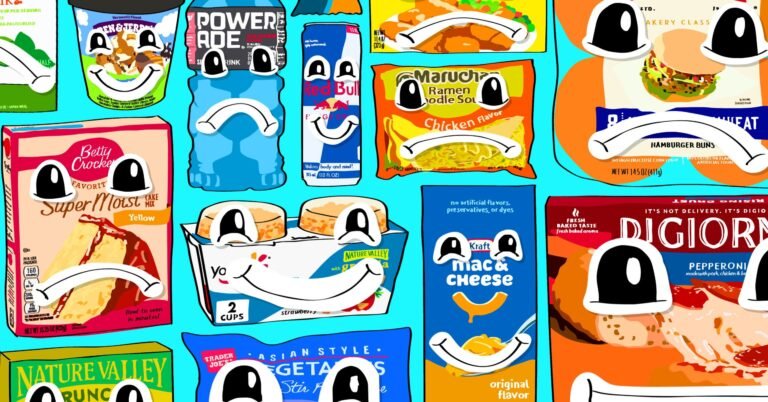Walking down the aisles of the supermarket, you will encounter bright packaging, bold fonts, and kaleidoscopes that attract the attention of the greatest promises. Instant noodles sturdy paper cups guarantee warmth in minutes, frozen dinner guarantees hard heartfelt satisfaction, and sugar-like cereals guarantee Nutritional micronutrient alphabet. These ultra-processed foods, known as UPF, are present and extremely popular among American shoppers, but modern nutrition perennial scapegoats that taste artificial dyes, flavor enhancers, emulsifiers, hydrogenated oils blamed for obesity, chronic diseases and dietary destruction.
Foods such as potato chips, packaged cookies, and frozen chicken nuggets are generally known to be more crucial products, such as protein bars, plant-based milk alternatives, silk tofu and even infant formulas, which also fit into the UPF basket, but also square-fitting thanks to ingredients like Xanthan gum and carrageenan. Recently, they have even come under the crosshairs of the Trump administration’s “Make America Healthy” initiative, and recently confirmed Robert F. Kennedy Jr. Frequently demo UPF. But what if this story misses a bigger picture?
UPF is not just a sum of the materials. These are boxed Macs and cheeses to extend your weekly grocery budget, ice cream tubs to provide comfort after a stressful day, and nostalgic breakfast cereals that come with weekend cartoons. These foods retain certain cultural resonances that are deeply connected to memory and comfort. Some food advocates are increasingly complicating UPFS perceptions as one villain by telling stories about survival, memory, and systematic inequality.
Jessica Wilson, a California-based registered dietitian and cultural food justice advocate, recalls UPF as the basis for her childhood diet. “I was raised by a single mother who wasn’t good at cooking and didn’t like it, so I was dependent on UPFS at the time,” she says. Last year, Wilson conducted her experiments. I ate a meal that accounts for 80% of UPFS, For a month, like Trader Joe’s Soy Chorizo and Costco Frozen Pupusa. She was often able to create a balanced diet that would help fatigue in nagging decisions and, more interestingly, includes all food groups: protein, carbohydrates, fats and more.
She wasn’t too worried about preparing meals, and overall felt bored, Wilson discovered, “After about a week, I wasn’t tired in the afternoon anymore.” She still eats some UPFs like Jarred Pasta Sauce and Trader Joe’s frozen Asian-style vegetables fried sauce, and it’s best to recommend that clients rely on moderately when meals and meal preparations begin to take over. Critical, not all foods considered to be ultra-highly processed are created equally. Many varieties of canned beans, yogurt and granola are typically considered nutritious and less common, but are all considered UPF.
Critics of UPF have often pointed to health concerns related to high levels of sodium, sweeteners and preservatives to increase shelf life and make these foods more enjoyable. A diet with high UPFS is associated with an increased risk of Heart disease, Diabetesand Other chronic diseases. “Hypertension, fatty liver disease, and certain cancers (almost all chronic diseases) are associated with a high incidence of UPF,” said Dr. Jenkadenhead, a behavioral nutrition researcher at Columbia University Teachers College. However, she makes it clear that no direct relationship has yet been established by the wider research and medical community. These are merely related. And on the other side, Raw meals– This means exclude all processed foods Juice Cleaning It is frequently touted as more healthy, and these are associated with nutrition, calorie and protein defects.
At the heart of UPF’s argument is a tough truth: fresh Whole Foods is inaccessible to everyone In the US. Farmer markets, organic produce, artisan bread and detox smoothies are often maintained as gold standards for healthy diets, but in most cases they are simply out of reach for low-income families. Meanwhile, snack-sized strawberry pints are priced at $3.30 as of January 2025. Average national pricea more complete meal for three people for just $1.97, along with a box of Kraft Mac & Cheese and a quarter cup of milk and four tablespoons of butter you’ll need. an Analytics tracking food prices Also, for over 12 years, raw foods have been found to cost more than twice as much as Calorie than Colorie.
This reality is exacerbated by systematic inequality that makes whole food preparation logistically and economically impossible: low wages, food deserts, insufficient public transport to reach high-quality grocery stores. Under SNAP and WIC, UPFS is often more affordable and takes less time to cook, It is more widely accessible and has more shelf stability than less processing and whole hoods. Framing UPFS as harmful without addressing these systematic issues can be oversimplified, especially complex issues. The Trump administration is looking to make big cuts to Snap and WIC, exacerbating the already threatening affordable crisis around the country’s lowest-income households’ food.
At the heart of UPF’s argument is a tough truth: fresh Whole Foods is inaccessible to everyone In the US.
As discourse about UPFS evolves, chefs and home cooks are reclaiming and rethinking them as well. Sarah Fennel, known for her website Broma Bakery and recent cookbook author Sweet teethFrozen Tater Tots have been incorporated into something suitable for a Super Bowl Watch party. Cheeseburger casserole, While created by Molly Baz Orange cream cicle poppy seed cake Inspired by the fun and sticky flavor of the ice cream bar.
Others are creating their own versions of famous brands. Cookbook Author Frankie Go has been steadily working on a recipe series that rethinks American food brands of Asian American culture. Gochujang Caramel Pop-Tarts and Cheerios with a sesame-miso flavor. “I thought it was an interesting experiment to redesign those legacy brands and use them as Trojans to start a conversation about food and culture,” Goh says. This series was not only a way to rethink food with diverse flavours and branding, but my way of trying to heal many immigrant children who have never been represented by their culture. ”
He usually makes everything from scratch, but Gaw doesn’t respectfully include UPF as an ingredient in his dishes. Green Rice and Spam and Black Sesame Oreo Goggart. He says to anyone who might think he “glorifies” UPFS. “Anything that is excessive can be considered unhealthy, and I am happy to die on the hill of burgers and chocolate chip cookies talking about foods that bring joy and remind me of my childhood.”
There is something liberating about retrieving these foods. It’s a way to acknowledge that these foods have supported us. They are part of our story and we don’t have to shame them.


